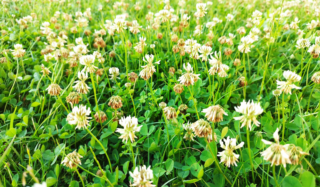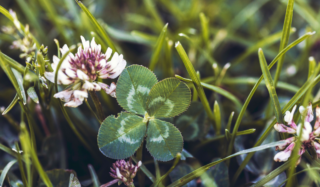Clover Lawns Are Pretty, Sustainable & Easy
Are you tired of mowing and watering your lawn? A simple solution benefits the environment in many ways: grow a clover lawn!
What’s a Clover Lawn?
It’s what it sounds like – a lawn covered with clover. The entire yard can be clover, or you can mix it in with traditional turf grass. There may be clover in your lawn already that you’ve weeded out. Why not leave it and let it naturally spread – free of charge?
Do Clover Lawns Look Nice?
Not only is a clover lawn aesthetically interesting to look at, but the texture of the clover adds a tactile sensation to the gardenscape. When the kids are bored, send them to the lawn to search for four-leaf clover and good luck. Who knows, they might even find a leprechaun!

How Much Work Does a Clover Lawn Need?
Most clover lawns require no mowing! So, cross that chore off the list. That said, some clover varieties can grow taller than others, so depending on your preference, a little trim once in a while will keep things on an even keel and tidy.
Are Clover Lawns Hardy?
You bet! Clover lawns are heat resistant, drought tolerant, and can survive cold, harsh winters. They’re not fussy about the type of soil they sink their roots into and don’t need fertilizing. Most clover grows in sun and shade, so it’s perfect in those pesky, shady areas where grass can be challenging to grow.

Are There Different Varieties of Clover to Choose from?
Yes! Dutch white clover is the most popular. It produces plenty of flowers and grows quickly.
Microclover is a variety of white clover with smaller leaves, making it more tolerant of wear and tear, which is worth considering if you send Fido out to run around.
Strawberry clover does well in all kinds of soil, and its florets take on a pinkish tone. However, this variety is finicky about temperatures and doesn’t like it too hot or cold.
Red clover has maroon-colored flowers, which add a dramatic flare to the landscape. Although it will grow best in well-draining soil, it can handle just about all soil types.

Are Clover Lawns Good for the Environment?
Clover lawns promote biodiversity by inviting pollinators like bees to collect the nectar and pollinate the surrounding ecosystem. Clover is a nitrogen-fixing plant that pulls nitrogen out of the air and converts it into soil nutrients—no more fertilizing, which is always good for the planet.
So, there you have it: clover lawns tick all the boxes for sustainability and attractiveness and will eliminate all those weekend lawn chores. If that isn’t a four-leafed clover piece of good luck, I don’t know what is.




